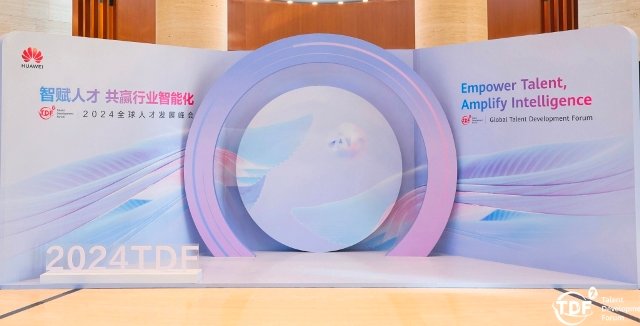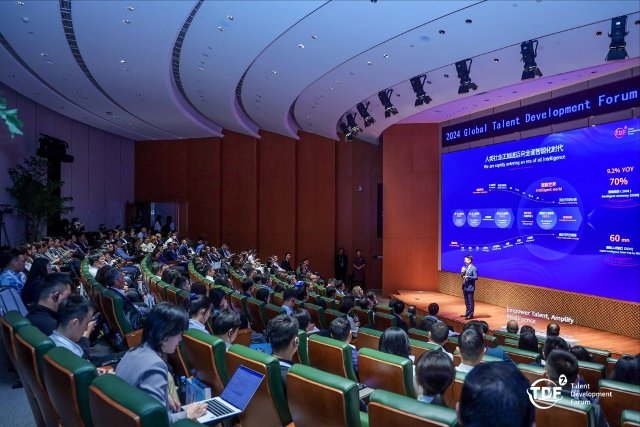
As the world evolves into a fully digital era powered by artificial intelligence, talent empowerment is being redefined, with intelligent technologies transforming skill development, personal growth, and the nature of work itself. In line with this transformation, Huawei’s Intelligent World 2030 report anticipates a future where AI and connectivity reshape industries. The report estimates that by 2030, every 10,000 workers will work with 1,000 robots, virtual and augmented reality (VR/AR) users will reach one million, and enterprises will increasingly deploy dedicated 5G-Advanced (5G-A) networks to support this evolution.
At the recently concluded 7th Global Talent Development Forum (TDF) organized by Huawei in Shenzhen, over 100 global leaders from industry organizations discussed the future of talent development. Themed, “Empower Talent, Amplify Intelligence,” the forum hosted industry thought leaders and experts from companies like Mercer, The Adecco Group, ESCP Business School, and the China Academy of Information and Communications Technology (CAICT). Together, they delved into future ICT trends, best practices in talent development, and strategies for cultivating digital talent essential for the digital transformation of the industry.
Hui Tao, director of Huawei ICT Industry Strategy Planning and Development Dept, unveiled the key insights from Huawei’s Intelligent World 2030 report and highlighted the growing demand for improved quality of life, renewable energy, automation of repetitive and dangerous tasks, as well as secure and reliable digital services.
The Shifting Landscape of Talent Empowerment
Jason Liu, president of Huawei’s Learning & Certification Services Department, opened the forum by addressing the significant changes AI has introduced to talent empowerment. He said this evolution is transforming the target, content, and mode of empowerment. “The target has shifted from ‘human’ to ‘human + AI’; the content now centers the integration of industry and technology, which is crucial for digital transformation; and the mode should encompass personalized learning and on-demand access to accurate knowledge.”
Empowering talent to grow business and address challenges
Peta Latimer, president of Mercer Asia, weighed in the challenges and opportunities of today’s digital world. She discussed the need for resilient organizational structures and a culture of digital adaptation to navigate societal shifts and technological advancements. “The integration of artificial intelligence (AI) will unlock new pathways for realizing talent potential,” she noted, underscoring AI’s potential to revolutionize traditional talent management.
From The Adecco Group, Caroline Styr, head of Thought Leadership Research, emphasized the transformative role of AI in boosting productivity and operational efficiency. “Technical talent has become a core driving force for enterprise development,” she stated, adding that investing in technical training can strengthen employees’ technical confidence and prepare businesses to adapt to the rapidly changing market environment.
Véronique Tran, executive vice president for Executive Education and Corporate Relations at ESCP Business School, discussed the importance of personal transformation within organizations. “Talent is the key to companies gaining a competitive edge during the transformation process” and emphasized that holistic integration of talent within the enterprise can drive sustainable development.
Junwei Li, Huawei’s deputy chief of Strategic Reserve and Director of Leadership & Human Resource Dept, emphasized the critical role of talent in overcoming business challenges. “The answer to the dilemma faced by enterprises in achieving continuous profitability and development still lies in the people,” he said. He also outlined Huawei’s strategy to focus on developing high-potential talent aligned with the company’s business goals.
Practical insights in navigating digital transformation in talent management
Sharing insights into successful talent development models, Ahmed Almadani, talent development director at Zain Saudi Arabia, noted the company’s focus on emerging trends like big data, cybersecurity, and AI, and said Zain is launching customized training programs designed to equip employees with the skills necessary to adapt to these changes.
Baoshu Liu, senior economist of China Petroleum and Chemical Corporation, shared the company’s 7-2-1 principle in developing managerial, application-oriented, and specialized technical talent amidst digital transformation. According to this model, “70% of capability improvement comes from practical experience, 20% from guidance and feedback from others, and the remaining 10% from learning and training,” he stated.
Kam-Shing Fung, vice president of Digital Transformation at HKT, shared the company’s experience using the Digital Talent Mature Model to align business objectives with talent management. He said, “By employing a common language for talent development management, we facilitate continuous learning and improvement, constantly enhancing our engineers’ skills to keep pace with digital technology.”
Building expertise for a new era of intelligent computing
Yunfa Liao, president of the CAICT East China Branch, called for the need for professionals with expertise in both intelligent computing and industry-specific knowledge. “This composite talent is crucial to amplifying the positive impact of large models and intelligent computing,” he noted, pointing to the need for specialized skills to drive high-quality development across industries.
The forum also saw the launch of the Digital Talent Mature Model (DTMM) 2.0, a collaborative effort between customers and partners to advance digital talent development and optimize training to meet the demands of emerging industrial intelligentization.
As part of the event, a Global CHRO Roundtable was held to explore how human resources (HR) can support digital transformation and enterprise innovation, featuring practical sharing and interactive talks on key HR priorities.
At the CHRO, Dr. Margaret Hu, senior consultant in the ICT strategy and marketing domain, described digital transformation as an “all-encompassing transformation that impacts everything from nations and cities to industries, from businesses to individuals.” She underlined the need to build core digital skills to meet emerging challenges.
Li Han, director of Huawei’s Center of Strategic Transformation Resources, emphasized the role of HR in digital transformation, saying, “Without people’s full understanding and support, digital transformation is often difficult to achieve. He added that HR’s competency is a decisive factor in the success of digital transformation.
Yongfang Sun, Huawei Top Mind Mentor of the 2012 Laboratories, unveiled strategies to unleash the power of top talent in driving enterprise technological innovation. “They must broaden their horizons, gain a deep understanding of the strategic needs of the business, and learn to effectively manage the relationship between technology and commerce,” he said. “Enterprises should also establish operational support mechanisms to safeguard and empower top talent.”
Looking Forward: Industry Collaboration and Knowledge Sharing
Rumeysa Kaymakcı, director at Turkcell Academy, recapped the essential role of technology, corporate culture, and leadership in driving successful digital transformation. She also highlighted the importance of HR dashboards for improving productivity and developing employee skills to support future growth.
The two-day event concluded with an interactive training session led by Hai Yan, Senior Consultant at Huawei, on intelligent computing and AI applications, providing attendees with a deep dive into the latest trends and innovations shaping the global talent landscape.
Huawei’s 2024 TDF underscored the company’s commitment to building a digital-ready workforce through open collaboration, industry-academia partnerships, and certifications spanning 23 subject areas. With Huawei’s comprehensive talent development service solutions, Huawei is not only preparing the next generation of ICT professionals but also paving the way for sustainable industry growth in an intelligent era.

